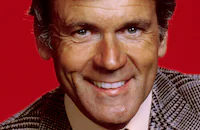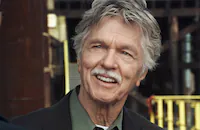One Man's Way

Brief Synopsis
Cast & Crew
Denis Sanders
Don Murray
Diana Hyland
William Windom
Virginia Christine
Carol Ohmart
Film Details
Technical Specs

Synopsis
Twelve-year-old Norman Vincent Peale determines never to become a clergyman because of the insults he has suffered as the son of a smalltown Ohio minister. He changes his mind when, years later, as a Detroit crime reporter, he becomes frustrated by his inability to relieve much of the suffering and misfortune he reports. He enters a seminary and is there regarded as a rebel because he believes in a God of love rather than of vengeance, but his zeal increases church attendance wherever he preaches. In Syracuse he convinces pretty co-ed Ruth Stafford that the life of a minister's wife can be exciting; and after their honeymoon he accepts a position at New York City's Marble Collegiate Church. His methods and preachings are criticized as his fame grows; but through radio, articles in magazines, and a syndicated newspaper column he develops his thesis that God helps those who help themselves. With the publication of his book The Power of Positive Thinking , the condemnation of his theological attitudes reaches new heights; and he is about to resign from his pulpit when an experience with a critically ill child, who is given no chance for survival by medical science but nevertheless rallies after Peale keeps a night-long prayer vigil, renews his faith in all he has written and preached. He decides to remain with his church.

Director
Denis Sanders
Cast

Don Murray
Diana Hyland

William Windom
Virginia Christine

Carol Ohmart
Veronica Cartwright
Liam Sullivan
June Dayton

Ian Wolfe
Charles Lampkin
Arthur Peterson Jr.
Hope Summers
Virginia Sale
Rory O'brien
David Bailey
Mickey Sholdar
Paul Marin
Hank Stanton
Bryan O'byrne

Eddie Ryder
Ed Peck
John Harmon
Joseph Hamilton
Tom Palmer
Sandra Gale Bettin
Wendy Ferdin
Sharyl Locke
Butch Patrick
Gerald Gordon

Tom Skerritt
Vernon Rich
Bing Russell
Ann Morgan Guilbert
Ed Prentiss
Arthur Marshall

Geraldine Wall
Jon Lormer
Jean Carson
Crew
Philip W. Anderson
Jack Angel
John W. Bloch
Lambert Day
Joe Di Bella
Herbert S. Greene
Eleanore Griffin
Ben Hersh
Morris Hoffman
Lillian Hokom
Edward Jewell
Willard Jones
Grace Kuhn
Ben Lane
Ernest Laszlo
Richard Markowitz
Dick Ross
Frank Ross
Frank Ross

Videos
Movie Clip



Film Details
Technical Specs

Articles
One Man's Way
By Richard Harland Smith

One Man's Way
Quotes
Trivia
Notes
"Ohio" exteriors filmed in Pasadena, California. Marble Collegiate Reformed Church sequences filmed in New York City.

Miscellaneous Notes
Released in United States 1964
Released in United States 1964













